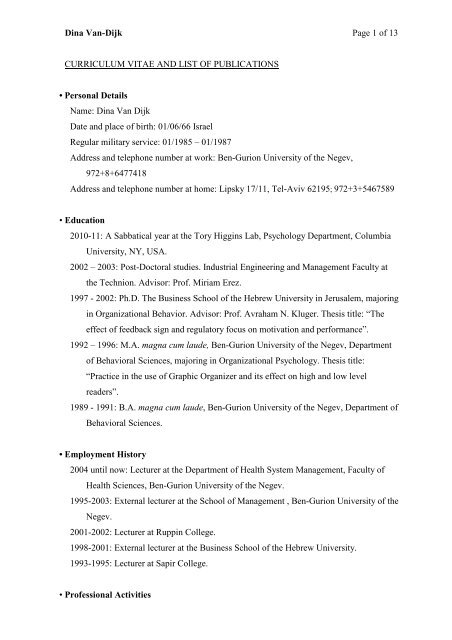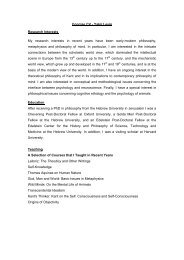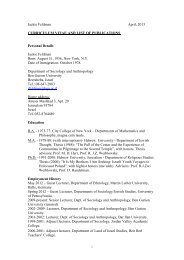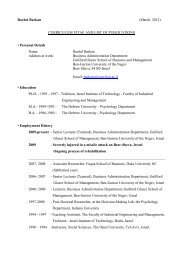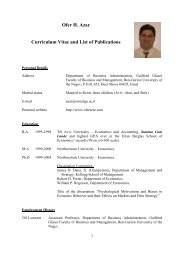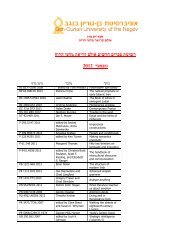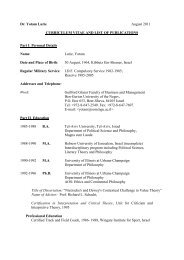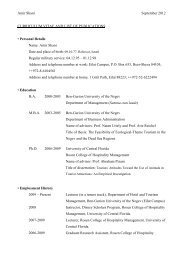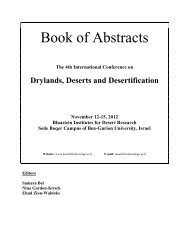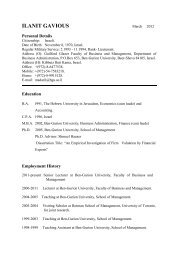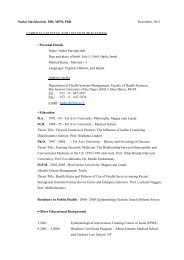Dina Van Dijk CV.pdf
Dina Van Dijk CV.pdf
Dina Van Dijk CV.pdf
You also want an ePaper? Increase the reach of your titles
YUMPU automatically turns print PDFs into web optimized ePapers that Google loves.
<strong>Dina</strong> <strong>Van</strong>-<strong>Dijk</strong> Page 1 of 13<br />
CURRICULUM VITAE AND LIST OF PUBLICATIONS<br />
• Personal Details<br />
Name: <strong>Dina</strong> <strong>Van</strong> <strong>Dijk</strong><br />
Date and place of birth: 01/06/66 Israel<br />
Regular military service: 01/1985 – 01/1987<br />
Address and telephone number at work: Ben-Gurion University of the Negev,<br />
972+8+6477418<br />
Address and telephone number at home: Lipsky 17/11, Tel-Aviv 62195; 972+3+5467589<br />
• Education<br />
2010-11: A Sabbatical year at the Tory Higgins Lab, Psychology Department, Columbia<br />
University, NY, USA.<br />
2002 – 2003: Post-Doctoral studies. Industrial Engineering and Management Faculty at<br />
the Technion. Advisor: Prof. Miriam Erez.<br />
1997 - 2002: Ph.D. The Business School of the Hebrew University in Jerusalem, majoring<br />
in Organizational Behavior. Advisor: Prof. Avraham N. Kluger. Thesis title: “The<br />
effect of feedback sign and regulatory focus on motivation and performance”.<br />
1992 – 1996: M.A. magna cum laude, Ben-Gurion University of the Negev, Department<br />
of Behavioral Sciences, majoring in Organizational Psychology. Thesis title:<br />
“Practice in the use of Graphic Organizer and its effect on high and low level<br />
readers”.<br />
1989 - 1991: B.A. magna cum laude, Ben-Gurion University of the Negev, Department of<br />
Behavioral Sciences.<br />
• Employment History<br />
2004 until now: Lecturer at the Department of Health System Management, Faculty of<br />
Health Sciences, Ben-Gurion University of the Negev.<br />
1995-2003: External lecturer at the School of Management , Ben-Gurion University of the<br />
Negev.<br />
2001-2002: Lecturer at Ruppin College.<br />
1998-2001: External lecturer at the Business School of the Hebrew University.<br />
1993-1995: Lecturer at Sapir College.<br />
• Professional Activities
<strong>Dina</strong> <strong>Van</strong>-<strong>Dijk</strong> Page 2 of 13<br />
(a) Positions in academic administration (departmental, faculty and university)<br />
2009: A member in the committee for accompanied Master students, Ben Gurion<br />
University.<br />
2011: A member in the committee for research students, Faculty of Management, Ben<br />
Gurion University.<br />
(b) Professional functions outside universities/institutions<br />
2009: A member of the ISF (Israel Science Foundation) committee for the field of<br />
Organizational Behavior (in the Business Administration section).<br />
• Educational activities<br />
(a) Courses taught<br />
"Work Motivation in Health Services". A course for graduate students in Health Systems<br />
Management.<br />
“Behavioral Science in Management”. A course for undergraduate students in Health<br />
Systems Management.<br />
“Research Methods”. A course for undergraduate students in Health Systems Management.<br />
(b) Research students<br />
1. 1. Dudi Eilat - Organizational Ethics: The relations between Leadership Style,<br />
Ethical Climate and the Perceived Morality of the Organization (doctoral student,<br />
co-supervised with Yotam Lurie). Received Award for his dissertation from the<br />
"Dov Israeli Center for Ethic" in Tel-Aviv University (2009).<br />
2. Michal Schodl - The effect of Regulatory Fit on Motivational Decisions (Doctoral<br />
student, co-supervised with Ayala Malach Pines).<br />
3. Hadas Shoshani - The Relationship between Regulatory Focus (Promotion/<br />
Prevention) and Feedback Seeking, and the Impact of the Expected -Actual<br />
Feedback Gap on Motivation (Doctoral student, co-supervised with Amos Drory).<br />
4. Ezolda Schriber, The Effect of Work Teams' Virtuality on Knowledge Sharing. The<br />
role of Social Integration, Group Identification, Heterogeneity and Trust (Doctoral<br />
student co-supervised with Amos Drory).<br />
5. Eithan Brodsky. Shifts in the Nursing Professional Status in Israel: Chronic Illness<br />
Management as a Case Study (Doctoral student co-supervised with Nadav<br />
Davidovitch).<br />
6. Eli Fishman – Collective Regulatory Focus in Teams' Performance (Master student)
<strong>Dina</strong> <strong>Van</strong>-<strong>Dijk</strong> Page 3 of 13<br />
7. Arik Weinstain - Regulatory Focus Moderating the Effect of Feedback Sign on<br />
Motivation: A Field Study (Master student – thesis submitted)<br />
8. Vadim Sukolsky – The Relationship between Regulatory Focus and Motivation to<br />
Quit Smoking (MHA student – thesis submitted)<br />
Graduated<br />
1. Shira Shimer – The Connection between Interns Values Structure and Specialty<br />
Preference (Master student, graduated 2006). (published her work; see scientific<br />
reports #15)<br />
2. Eithan Brodsky – Advanced Specialist Nursing Practice: Attitudes of Nurses and<br />
Physicians in Israel (MHA student, graduated 2007). (published his work; see<br />
refereed articles #6 and proceedings #12 )<br />
3. Tamar Walfisch - Factors Affecting the Effectiveness of Apologizing: The<br />
Communication Channels, Length of Apology, Gender, and Status Disparities<br />
between Offender and Offended (Master student, graduated 2007). She won the<br />
Award for excellent paper from the “Industrial Relations Research Association of<br />
Israel” (July, 2007). (published her work; see refereed articles #10)<br />
4. Amir Grinberg – The Effect of Labeling Patients as "Unpopular" on the Quality of<br />
Care they Receive (Doctoral student, co-supervised with Yossi Pliskin, graduated<br />
2008 with distinction).<br />
5. Nava Braverman – Childbirth Services in Jerusalem Hospitals: Examination of<br />
Alternative Models (completing thesis, graduated 2008).<br />
6. Hadas Shoshani - The relationships between career anchors and gender to medical<br />
specialty choice (completing thesis, graduated 2008)<br />
7. Michal Teeni – Leadership Style Effect on Employees Emotion: Regulatory Focus<br />
as a Moderator (MHA student, graduated 2009)<br />
8. Nurit Porat - Hospital department head leadership effect on safety and quality<br />
climates: The mediating role of collaboration with department head nurse (Doctoral<br />
student, co-supervised with Yohanan Faiser and Meir Brazis, graduated 2010).<br />
(c) Member of editorial board of scientific journal<br />
(d) Membership in professional/scientific societies<br />
Member of the Academy of Management (AOM), Society of Industrial and<br />
Organizational Psychology (SIOP), European Association of Work and Organizational<br />
Psychology (EAWOP), Association for Psychological Sciences (APS).
<strong>Dina</strong> <strong>Van</strong>-<strong>Dijk</strong> Page 4 of 13<br />
(e) Reviewer for Academic Journals, Conferences and Scientific Foundations<br />
Organizational Behavior & Human Decision Processes, Organization Science, Applied<br />
Psychology: An International Review, Journal of Applied Social Psychology, European<br />
Journal of Social Psychology, Journal of Occupational and Organizational Psychology,<br />
Journal of Clinical and Social Psychology, Quarterly Journal of Experimental<br />
Psychology, British Journal of Social Psychology.<br />
• Awards, Citations, Honors, Fellowships<br />
• Overall Best Paper Award (2011) from the "International Academy of Management and<br />
Business (IAMB)" 2011, for the paper: "Leadership Style Effect on Employees'<br />
Performance: Regulatory Focus as a Mediator" (<strong>Van</strong> <strong>Dijk</strong> and Kark).<br />
• Award for Best Competitive Paper (2009) from the " OB Division of the Academy of<br />
Management (AOM)", for the paper: "Does task type moderate the effect of feedback<br />
sign on motivation and performance?"(<strong>Van</strong> <strong>Dijk</strong> and Kluger).<br />
• Best Paper Runner-up Award (2005) from "The International Leadership Association<br />
Scholarship Global Learning Community", for the paper: "Prevention or Promotion:<br />
The Relationship between Leadership and Motivation" (Kark and <strong>Van</strong> <strong>Dijk</strong>).<br />
• Best Paper Runner-up Award (2003) from the “Industrial Relations Research<br />
Association of Israel”, for the paper: "Prevention-Focused feedback versus promotion<br />
focused feedback".<br />
• Award for Excellence: Louis & Sylvia Vogel Prize for excellence at the School of<br />
Business Administration at the Hebrew University (June 2000).<br />
• Scholarship for Doctoral Studies from the Business School of the Hebrew University<br />
(1998-2000).<br />
• The Dean’s Award for Excellence in M.A. studies. Ben-Gurion University of the Negev<br />
(1993).<br />
• Award for excellence in B.A. studies from the Department of Behavioral Sciences<br />
(1990).<br />
• Scientific Publications<br />
Refereed articles in scientific journals<br />
1. <strong>Van</strong>-<strong>Dijk</strong>, D., & Kluger, A. N. (2004). Feedback-Sign effect on motivation: Is it<br />
moderated by regulatory focus? Applied Psychology: An international review, 53
<strong>Dina</strong> <strong>Van</strong>-<strong>Dijk</strong> Page 5 of 13<br />
(1), 113-135. (A-; rated as 8/67 in applied psychology; Impact Factor: 2.75; quotes:<br />
90, according to google scholar)<br />
2. Cohen AD, <strong>Van</strong>-<strong>Dijk</strong> D, Naggan L, Vardy DA. (2005). The Effectiveness of<br />
Climatotherapy at the Dead Sea for Psoriasis Vulgaris. A Community Oriented<br />
Study Introducing "Beer Sheva Psoriasis Severity Score. J Dermatol Treat, 16:308.<br />
(Impact factor: 2.115, quotes: 18 according to google scholar)<br />
3. Kark, R. & <strong>Van</strong> <strong>Dijk</strong>, D. (2007). Motivation to lead motivation to follow: The role<br />
of the self-regulatory focus in leadership processes. Academy of Management<br />
Review, 32(2), 500-528. (A+; rated as 1/101 in Management; Impact factor: 6.73;<br />
quotes: 154, according to google scholar)<br />
4. Cohen, A.D., Shapiro, J., Michael, D., Hodak, E., <strong>Van</strong> <strong>Dijk</strong>, D., Naggan, L., &<br />
Vardy, D.A. (2008). The Outcome of "Short Term" Dead Sea Climatotherapy for<br />
Patients with Psoriasis. Vulgaris. Acta Dermato Venereologica, Vol 88(1), Pp. 90-<br />
91. (Impact factor: 2.78)<br />
5. Cohen AD, <strong>Van</strong>-<strong>Dijk</strong> D, Naggan L, Vardy DA. (2008). Factor Analysis of the Beer<br />
Sheva Psoriasis Severity Score (BPSS), IMAJ, Vol 10, Pp. 1-5. (Impact factor:<br />
0.953)<br />
6. Brodsky, E., & <strong>Van</strong> <strong>Dijk</strong>, D. (2008). Advanced/Specialist Nursing Practice:<br />
Attitudes of Nurses and Physicians in Israel. Journal of Nursing Scholarship, Vol<br />
40(2), Pp. 187-194. (Rated 18/88 in nursing; Impact factor: 1.39)<br />
7. Kluger, A. N., & <strong>Van</strong> <strong>Dijk</strong>, D. (2010). Feedback, the various tasks of the physician,<br />
and the feedforward alternative. Medical Education, 44 (12), Pp. 1166-1174. (A;<br />
rated as 2/32 in Education and 11/72 in health care sciences & services; Impact<br />
factor: 2.63).<br />
8. <strong>Van</strong> <strong>Dijk</strong>, D., & Kluger, A. N. (2011). Task type as a moderator of<br />
positive/negative feedback effects on motivation and performance: A regulatory<br />
focus perspective. Journal of Organizational Behavior, Vol 32, Pp. 1084-1105. (B ;<br />
rated 15/67 in applied psychology; Impact factor: 2.35)
<strong>Dina</strong> <strong>Van</strong>-<strong>Dijk</strong> Page 6 of 13<br />
9. <strong>Van</strong> <strong>Dijk</strong>, D., Holzman Schweid, K., Bin Nun, G., & Kushnir, T. (2011). Job<br />
satisfaction, intention to leave and leaving the practice of medicine among<br />
physicians In Israel: A survey of physicians receiving their licenses in 2000, 2002,<br />
2004, 2006. Harephuah (Hebrew).<br />
10. Walfisch, T., <strong>Van</strong> <strong>Dijk</strong>, D., & Kark, R. (in press). Do you Really Expect Me to<br />
Apologize? The Effect of Professional Status and Gender on the Effectiveness of<br />
Apology at Work. Journal of Applied Social Psychology (rated 48/56 in social<br />
psychology; impact factor: 0.73).<br />
Proceedings<br />
11. <strong>Van</strong> <strong>Dijk</strong>, D., & Kluger, A. N. (2009). Does task type (prevention vs. promotion)<br />
moderate the effect of feedback sign on motivation and performance? In George T.<br />
Solomon (Ed.), Proceedings of the Sixty-Sixth Annual Meeting of the Academy of<br />
Management, ISSN.<br />
12. Brodsky, E., & <strong>Van</strong> <strong>Dijk</strong>, D. (2009). Advanced and Specialist Nursing Practice:<br />
Chapters<br />
Attitudes of Nurses and Physicians in Israel. In B. Rosen, A. Israeli & S. Shortell<br />
(Eds.). Improving Health and Health Care: Who is Responsible? Who is<br />
Accountable? Proceedings of the 4 th International Jerusalem Conference on Health<br />
Policy<br />
13. Kark, R., & <strong>Van</strong> <strong>Dijk</strong>, D. (2008). Birds of a Feather Flock Together: The<br />
Relationship between Leader-Follower Self Regulation Congruency, LMX and<br />
Outcomes. In G. B. Graen and J. A. Graen (Eds.) Knowledge Driven<br />
Corporation: A Discontinuous Model. LMX Leadership: The Series. Volume VI.<br />
Charlotte, NC: Information Age Publishing Inc.<br />
Published scientific reports and technical papers<br />
14. Kluger, A. N., & <strong>Van</strong>-<strong>Dijk</strong> D. (2005). The interactive effect of feedback sign and<br />
task type on motivation and performance. A technical report. The U.S. Army<br />
Research Institute for the Behavioral and Social Sciences.
<strong>Dina</strong> <strong>Van</strong>-<strong>Dijk</strong> Page 7 of 13<br />
15. <strong>Van</strong> <strong>Dijk</strong>, D., Shimer, S., & Bloch, Y. (2008). Altruism or ambition? The effect of<br />
personal values on the choice of specialty among medical interns. Medical, 19, 7-<br />
11. (Hebrew)<br />
Submitted for publication<br />
16. <strong>Van</strong> <strong>Dijk</strong>, D., Seger, T., & Heller, D. (R&R). Regulatory Focus and Subjective<br />
Well-Being under a Life Threatening Situation: A Longitudinal Field Study.<br />
"Emotion" (A; rated 14/81 Psychology experimental; impac factor: 3.027).<br />
Working papers<br />
<strong>Van</strong> <strong>Dijk</strong>, D., Shimer, S., Bloch, Y. (manuscript). The effect of personal values on the<br />
choice of specialty among medical interns.<br />
<strong>Van</strong> <strong>Dijk</strong>, D., Weinstein A. (manuscript). Feedback Sign - Regulatory Focus Fit effect on<br />
Motivation: A Field Study.<br />
Shoshani, H., <strong>Van</strong> <strong>Dijk</strong>, D., & Valency, R. (manuscript). The effect of career anchors on<br />
medical specializations among medical students.<br />
Grinberg, A., <strong>Van</strong> <strong>Dijk</strong>, D. , & Pliskin, J. (manuscript). Inequity in Health Care Systems:<br />
Does Labeling Patients as "Unpopular" affect the Quality of Care they receive?<br />
Kark, R. & <strong>Van</strong> <strong>Dijk</strong>, D (manuscript). Empirical evidence for the role of regulatory focus<br />
in the leadership process.<br />
<strong>Van</strong> <strong>Dijk</strong>, D., Holzman-Schweid, K., Bin-Nun, G., & Kushnir, T. (manuscript). Doctors<br />
Leaving the Medical Profession and the Health System in Israel .<br />
• Presentation of papers at conferences/meetings<br />
<strong>Van</strong> <strong>Dijk</strong> D., & Kluger, N.A. (2011). Regulatory Focus Theory: Implications for<br />
Organizational Behavior. A symposium accepted for presentation at the<br />
upcoming 1st Israel Organizational Behavior Conference, Tel-Aviv University,<br />
December 21-22nd, 2011.
<strong>Dina</strong> <strong>Van</strong>-<strong>Dijk</strong> Page 8 of 13<br />
Kark, R., & <strong>Van</strong> <strong>Dijk</strong>, D. (2011). Birds of a feather flock together: The Relationship<br />
between Leader-Follower Self Regulation Congruency, LMX, and Organizational<br />
Commitment. Presented at the 4th Annual EuroMed Academy of Business<br />
Conference in Crete, Greece.<br />
<strong>Van</strong> <strong>Dijk</strong>, D., & Kark, R. (2011). Leadership Style Effect on Employees' Performance:<br />
Regulatory Focus as a Mediator. A paper presented at the 9th International Academy<br />
of Management and Business (IAMB) Conference in Orlando, Florida.<br />
Porat, N., <strong>Van</strong> <strong>Dijk</strong>, D., Feiser, Y., & Brezis, M. (2010). Hospital department head<br />
leadership effect on safety and quality climates: The mediating role of collaboration<br />
with department head nurse. A poster presented at the 8 th Annual Health Policy<br />
Conference, Hilton Hotel, Tel-Aviv, December, 2010. (Hebrew)<br />
<strong>Van</strong> <strong>Dijk</strong>, D. (2010). Positive vs. Negative Feedback Effect on Motivation and<br />
Performance: A Regulatory Fit Perspective. A paper presented at the Society of<br />
Experimental Social Psychology (SESP) conference in Minneapolis, Minnesota.<br />
Brodsky, E., <strong>Van</strong> <strong>Dijk</strong>, D. (2009). Advanced/specialist nursing: Attitudes of nurses and<br />
physicians in Israel. A paper presented at the 4 th International Jerusalem conference<br />
on Health Policy. Jerusalem, Israel.<br />
Porat, N., <strong>Van</strong> <strong>Dijk</strong>, D., Brezis, M. (2009). The Relationship Between the Leadership<br />
Style of Hospital Department Head, Cooperation with Head Nurse, and Climate of<br />
Quality and Patient Safety in General Hospital. A paper presented at the 16 th annual<br />
conference of The Israel Society for Quality in Medicine (Israel, November, 2009).<br />
<strong>Van</strong> <strong>Dijk</strong>, D., & Seger, T. (2009). When the guns roar the muses are silent: The<br />
relationships between regulatory focus, emotions and health in time of war. A paper<br />
presented at the Institute for Research on Emotions Annual Meeting, Leuven<br />
Belgium.<br />
<strong>Van</strong> <strong>Dijk</strong>, D., & Kluger, N.A. (2009). Does task type moderate the effect of feedback<br />
sign on motivation and performance? A paper presented at the Academy of<br />
Management Annual Meeting, Chicago.
<strong>Dina</strong> <strong>Van</strong>-<strong>Dijk</strong> Page 9 of 13<br />
Teeni M., <strong>Van</strong> <strong>Dijk</strong>, D., & Kark, R. (2009). The Effect of Leadership Style and<br />
Regulatory Focus on Followers' Emotions. A paper presented at the Academy of<br />
Management Annual Meeting, Chicago.<br />
Grinberg, A., <strong>Van</strong> <strong>Dijk</strong>, D., & Pliskin, J. S. (2009). Inequity in Health Systems? The<br />
Influence of Labeling Patients and the Quality of Care They Receive: The Unpopular<br />
Patient”. A paper presented in The International Conference on Communication in<br />
Healthcare, USA .<br />
<strong>Van</strong> <strong>Dijk</strong>, D., Yaffe T., & Levontin, L. (2008). The Effect of Personal Values on the<br />
Engagement in Organizational Citizenship Behavior. A paper presented at the Third<br />
International Conference on Interdisciplinary Social Sciences, Prato, Toscana.<br />
<strong>Van</strong> <strong>Dijk</strong>, D. & Kark, R. (2008). Motivation to Lead: The Relationships between Self<br />
Regulatory Focus and Leadership Style. A paper presented at the 2008 annual meeting<br />
of the Academy of Management, Anaheim, California.<br />
Kark, R., & <strong>Van</strong> <strong>Dijk</strong>, D. (2008). Birds of a Feather Flock Together: The Relationship<br />
between Leader-Follower Self Regulation Congruency, LMX and Outcomes. A paper<br />
presented at the 2008 annual meeting of the Academy of Management, Anaheim,<br />
California.<br />
<strong>Van</strong> <strong>Dijk</strong>, D., Shimer, S., Cohen, A., & Bloch, Y. (2007). The Connection between Values<br />
and Medical Specializations among Medical Interns. A poster presented at the Sixth<br />
Annual Health Policy Conference, Hilton Hotel, Tel-Aviv, December, 2007. (Hebrew)<br />
Walfisch, T., <strong>Van</strong> <strong>Dijk</strong>, D., Kark, R. (2007). Factors Influencing the Effectiveness of<br />
Apology at Work: Formality Level, Length of Apology, Status, and Gender of the<br />
Opponents. A paper presented at the Second International Conference on<br />
Interdisciplinary Social Sciences, July 2007.<br />
Brodsky, E., & <strong>Van</strong> <strong>Dijk</strong>, D. (2007). Advanced/Specialist Nursing Practice: Attitudes of<br />
Nurses and Physicians in Israel. A paper presented at the 6 th International Conference<br />
on Health Economics, Management & Policy. Athene, Greece, June, 2007.
<strong>Dina</strong> <strong>Van</strong>-<strong>Dijk</strong> Page 10 of 13<br />
Ben-Natan, O., Hassin, D., Freiger, M., <strong>Van</strong> <strong>Dijk</strong>, D., Goldberg, A. (2007). The attitude of<br />
the Israeli population on coping with epidemic outbreaks. A paper presented at the<br />
15th World Congress on Disaster and Emergency Medicine. Amsterdam, May 2007.<br />
Kark, R., <strong>Van</strong> <strong>Dijk</strong>, D. (2005). Motivation to lead motivation to follow: The role of the<br />
self-regulatory focus in leadership processes. A paper presented at the 2005 annual<br />
meeting of the Academy of Management, Honolulu, Hawaii.<br />
Kaplan, E., Erez, M., & <strong>Van</strong>-<strong>Dijk</strong>, D. (2004). When “do best” is more effective than<br />
specific goals? The moderating effect of prevention/promotion focus in creative tasks.<br />
A paper presented at the 19th Annual convention of the Society for Industrial and<br />
Organizational Psychology, Chicago, Illinois.<br />
<strong>Van</strong>-<strong>Dijk</strong>, D., & Yaffe, T. (2004). What Motivates Organizational Citizenship Behavior?<br />
Prevention – promotion and collectivism – individualism as predictors of OCB. A<br />
paper accepted for the workshop “Future challenges in OCB theory and research”, Ben-<br />
Gurion University of the Negev, Eilat, Israel.<br />
<strong>Van</strong>-<strong>Dijk</strong>, D., & Kluger, A. N. (2003). “Feedback gains: Success in creative tasks and<br />
failure in error-detection”. A paper presented at the 18 th Annual convention of the<br />
Society for Industrial and Organizational Psychology, Orlando.<br />
<strong>Van</strong>-<strong>Dijk</strong>, D., & Kluger, A. N. (2001). Promotion-focused feedback versus prevention-<br />
focused feedback: When and for what class of employees each feedback type is<br />
effective? (In Hebrew). A paper presented at the 13th Israeli annual conference on<br />
Human Resource Management. Kfar HaMaccabia, Israel.<br />
<strong>Van</strong>-<strong>Dijk</strong>, D., & Kluger, A. N. (2001). Goal-Orientation versus Self-Regulation: Different<br />
labels or different constructs? A paper presented at the 16th Annual convention of the<br />
Society for Industrial and Organizational Psychology, San-Diego.<br />
<strong>Van</strong>-<strong>Dijk</strong>, D., & Kluger, A. N. (2000). Positive (Negative) Feedback: Encouragement or<br />
Discouragement? A paper presented at the 15th Annual convention of the Society for<br />
Industrial and Organizational Psychology, New Orleans, Louisiana.
<strong>Dina</strong> <strong>Van</strong>-<strong>Dijk</strong> Page 11 of 13<br />
• Research Grants<br />
2009-2011: NIHP (The Israel National Institute for Health Policy) grant to <strong>Van</strong> <strong>Dijk</strong> <strong>Dina</strong>,<br />
Kushnir Talma and Bin-Nun Gabi for the research on "Physicians' leaving the health<br />
system in Israel" – a total of 195,000 NIS for two years.<br />
2007 – 2010: ISF (Israel Science Foundation) grant to Kark Ronit and <strong>Van</strong> <strong>Dijk</strong> <strong>Dina</strong> for<br />
the research on "Motivation to lead, motivation to follow" – a total of 285,000 NIS for<br />
three years.<br />
2003 : USRI (The US Army Research Institute) grant to Kluger, A., <strong>Van</strong>-<strong>Dijk</strong>, D., and<br />
Erez, M. “The interactive effect of feedback-sign and regulatory focus on performance<br />
of creative task versus error-detection task” – 20,000$ for one year.<br />
• Present Academic Activities -- Research in progress<br />
Regulatory focus as a moderator of the effect of stressful life events on well-being and<br />
health (in collaboration with Tory Higgins, Columbia University)<br />
Regulatory focus and feedback-sign effect on motivation: Expectancy and Valence as<br />
possible underlie mechanisms (in collaboration with Tory Higgins and Kevin<br />
Phulman, Columbia University)<br />
Regulatory focus and feedback sign effect on motivation: When success is danger and<br />
failure is advantage (in collaboration with Abigail Scholer, University of Waterloo).<br />
Advanced nursing practice: Attitudes and quality of care (in collaboration with Shoshi<br />
Goldberg, Hana Kertzman, and Limor Eisenberg)<br />
Motivation to lead, motivation to follow: The effects of regulatory focus on the leadership<br />
process (in collaboration with Ronit Kark and Michal Teeni).<br />
The effect of regulatory focus on resource allocation and feedback seeking (in<br />
collaboration with Hadas Shoshani and Michal Schodl)<br />
Prevention and promotion foci and their effect on health behaviors (with Rinat Avraham,<br />
Vadim Sukolsky).
<strong>Dina</strong> <strong>Van</strong>-<strong>Dijk</strong> Page 12 of 13<br />
Synopsis of research, including reference to publications and grants in<br />
above lists<br />
My current research aiming to understand the role motivation plays in influencing<br />
organizational behavior and well-being. More specifically, I'm interested in how the motivationalregulatory<br />
focus affects peoples' reaction to feedback, relationship with supervisor, career choice,<br />
and their well-being and health. The following synopsis of research will describe my research<br />
agenda and achievements in the past seven years and will outlay plans for ongoing and<br />
further research.<br />
In my doctoral dissertation from the School of Business Administration of The<br />
Hebrew University in 2003, I explored how the motivational system --promotion-<br />
prevention focus -- affects the reaction of individuals to external feedback. I found that<br />
when people are motivated by a promotion focus, positive feedback encourages them to<br />
work harder than negative feedback. Conversely, when people are motivated by a<br />
prevention focus, negative feedback encourages them to work harder than positive<br />
feedback. Together with Avraham Kluger, my PhD advisor, we have shown this effect in<br />
both lab and field (refereed articles #1, #8 and scientific report #14). For this work, we<br />
received the Best Competitive Paper Award (2009) from the "OB division of the Academy<br />
of Management," Recently, we suggested some unique implications of our work that could<br />
be exclusively fit to healthcare systems (refereed article #7).<br />
My work on regulatory focus theory had extended in two other research directions:<br />
leadership and more recently, to well-Being and health. In the leadership arena, I have<br />
studied the role of regulatory focus as both mediator and moderator of the relationships<br />
between leadership style and follower outcomes. A conceptual work done together with my<br />
colleague, Ronit Kark, was published in the Academy of Management Review (refereed<br />
article #3). Later, we presented another theoretical framework in which the unit of analysis<br />
is the leader–follower dyad (chapter #13). Additionally, our work on regulatory focus and<br />
leadership was awarded the Best Paper Runner-up Award (2005) from "The International<br />
Leadership Association Scholarship Global Learning Community" and in 2011, it received<br />
the Overall Best Paper Award from the "International Academy of Management and<br />
Business." Moreover, this work had won a research grant from the Israel Science<br />
Foundation (ISF). During the last two years, we have collected data in the field and in the<br />
laboratory to test our conceptual framework. At this stage, we are working on several<br />
empirical papers which examine this framework.<br />
Another direction of my current work on regulatory focus focuses on the connection<br />
between regulatory focus and well-being. In a longitudinal field study conducted with<br />
Israeli residents exposed to heavy missile attacks during 2009, we showed that a<br />
threatening situation was related to a high level of prevention focus among the exposed<br />
population and that this level of prevention focus further mediated the relationships<br />
between the threat and the population's well-being and subjective health (submitted article<br />
#16).<br />
In the last year I spent a sabbatical year as a visiting scholar at Columbia University<br />
in New York City. I continued to work on the well-being research with Tory Higgins in his<br />
lab in the Psychology Department. During this year, we tested the role of promotion focus<br />
in buffering the negative effect of stressful events on well-being and subjective health. In<br />
addition to this research, I was able to continue my previous work on feedback with a<br />
collaboration of scholars from Columbia.<br />
Finally, since receiving my position in the Department of Health Systems<br />
Management, I have started to work on health-related issues. Specifically, I collaborated<br />
with a group of physicians aiming to develop a new investigating tool for the diagnosis of<br />
psoriasis. This new tool is a self-report questionnaire that is supposed to be completed by<br />
both the physician and the patient to give a better indication for the severity of the disease
<strong>Dina</strong> <strong>Van</strong>-<strong>Dijk</strong> Page 13 of 13<br />
as perceived not only by the doctor (as was the case in the gold-standard existing tool) but<br />
also by the patient (refereed articles #2, #4. and #5). With the same approach, I have<br />
continued to investigate other health-related issues in collaboration with my students and<br />
other colleagues (refereed articles #6 and #15). One of these works is an extensive survey<br />
that we have done on intentions to leave the medical profession among new physicians in<br />
Israel (refereed articles #9). This study has won a grant from the Israel National Institute<br />
for Health Policy Research (NIHP) and is still ongoing.<br />
My future research will be focused on work motivation and regulatory focus, as I am<br />
continuing to explore the influences that motivational foci of individuals have on their<br />
behavior, performance, and well-being. A special focus for future research will be the<br />
implementation of my findings to healthcare systems.<br />
Teaching and supervision:<br />
My research activities have informed my teaching perspectives, content and<br />
courses. I enjoy considerable ongoing interaction with students, discussing research issues<br />
and plans. In the last years I have supervised students from psychology, business<br />
administration, and health system management. Four MA students that I have supervised<br />
have already graduated; two of them had already published their work (refereed articles #6<br />
and #10) and I am currently supervising 3 MA students in different stages of their work. I<br />
am also jointly supervising five PhD students, who are in different stages of their work.<br />
Two more PhD students had graduated recently and are in different stages of writing for<br />
publication.


